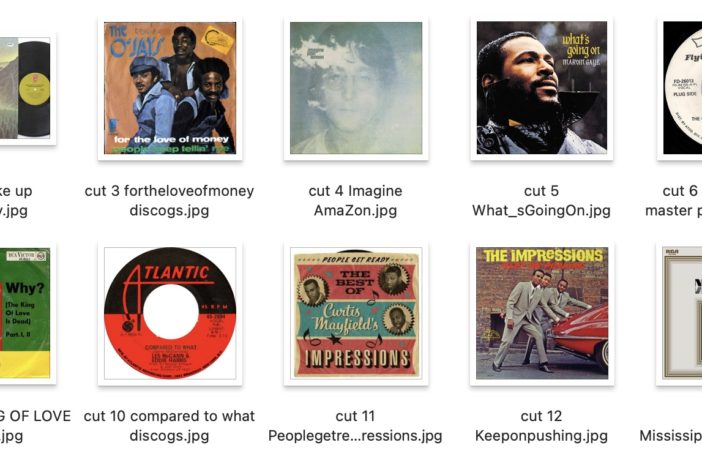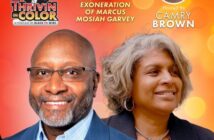By Dandrea V. James
Cut 1: “That’s the Way of the World” was released in 1975 by Earth, Wind & Fire.
Photo: Courtesy of Amazon
Cut 2: “Wake Up Everybody” is a classic by Harold Melvin and the Blue Notes, released in 1975.
Photo: Courtesy of Spotify
Cut 3: In 1974, The O’Jays crooned about society’s ills in their hit “For the Love of Money.”
Photo: Courtesy of Discogs
Cut 4: In 1971, John Lennon asked the world to take the first step of making change with his song titled “Imagine.”
Photo: Courtesy of Amazon
Cut 5: Marvin Gaye’s powerful classic “What’s Going On?” hit the shelves in 1971.
Photo: Courtesy of Amazon
Cut 6: “Creator Has a Master Plan,” debuted in 1969 by Pharoah Sanders and Leon Thomas.
Photo: Courtesy of Discogs
Cut 7: “I Don’t Want Nobody to Give Me Nothing (Open Up the Door I’ll Get It Myself)” by James Brown was released in 1969.
Photo: Courtesy of Discogs
Cut 8: “Say It Loud (I’m Black and I’m Proud),” became the unofficial Black Anthem in 1968, thanks to the legendary James Brown.
Photo: Courtesy of Discogs
Cut 9: In 1968, Nina Simone released the song “Why? (The King of Love Is Dead).”
Photo: Courtesy of Discogs
Cut 10: The song “Compared to What?” by Eugene McDaniels and Les McCann debuted in 1966.
Photo: Courtesy of Discogs
Cut 11: “People Get Ready” by The Impressions, which included the incomparable Curtis Mayfield, is an inspiring song from 1965.
Photo: Courtesy of Amazon
Cut 12: “Keep On Pushing” another great theme from The Impressions, was released in 1964.
Photo: Courtesy of Discogs
Cut 13: Nina Simone put the ills of the racist American South on display in her 1964 track, “Mississippi Goddam,” a tune first performed at Carnegie Hall.
Photo: Courtesy of Amazon
As a future ancestor, I encourage young folks to consider what Juneteenth means to them. To me, Juneteenth means critical thinking, collective destiny and veneration of the spirit of solidarity. Since June is also Black Music Month, this is also a good time to reflect on socially conscious music.
Juneteenth honors the day in 1865 when the enslaved in and around Galveston, Texas, found out they had been freed two-and-a-half years after the Emancipation Proclamation had been signed. This bittersweet commemoration of freedom is now a federal holiday on June 19. It has grown in popularity with massive parades and festivals in some cities.
Whether you look to rationalize the ideas of the Confederate states or the Union, the bottom line is that post-Civil War socio-political issues are still based on color vs. content of character. A question of whose race is more deserving of a good quality of life and freedom from fear in this country still evokes balking, battles and bloodshed.
As the years unfold, generations come and go. It is critical to ensure that our youthful successors continue to nurture a connection with the cultural-spiritual practices of acknowledging ancestors long gone and recently passed. Remember their contributions and sacrifices which are testament to their critical thinking and how they used their talents and skills in every facet of life to alleviate our suffering. These are noble acts of solidarity. It is our collective destiny to nurture and live in solidarity. In fact, all Afro-American holidays and observances are opportunities to do so.
As for naysayers who postulate that “Black people can never have solidarity ’cause they can never get together and do anything,” I say kindly put on your sociological thinking caps and examine our music history, especially the socially conscious music from the 1960s and 1970s. This music exudes the spirit of solidarity. And while you’re at it, kindly consider the definition of solidarity put forth by members of Black Wall Street, the Deacons for the Defense, the Civil Rights Movement and the Black Panther Party— just to name a few.
Hence, if some or all of you good folks out there are thinking about ways to commemorate Juneteenth in a way that will stir the spirits of the Middle Passage with jubilant praises of strength, struggle, and survival and that will blaze a path to the souls of Black folk through veneration of the spirit of solidarity, then this Juneteenth, let’s take it to the bridge and reconnect with the spirit of socially conscious music from the 1960’s and 1970’s.
I put together a suggested playlist of tunes that are personal favorites of Pulitzer Prize-winning journalist Patrice Gaines, award-winning journalist and Howard University professor, Dr. Yanick Rice Lamb, and bibliophile and co-founder of the Hurston/Wright Foundation, Clyde McElvene. Each of whom I asked, “What are three of your favorite socially conscious songs from the 1960s and 1970’s?
A note: Our beloved Godfather of Soul, James Brown, used the expression “Take It to the Bridge” in his performances both live and recorded. I never tired of hearing him do so. It has been absorbed into my soul power flower petals down to the roots. Not only does it refer to a point of transition in music that connects one part to the other or a hyped beat-break for really gettin’ down, it may also refer to a place of contemplation for understanding and upliftment.
As a literary artist and “Flower Child” who views life from the perspective of “love, peace and soul,” I am duty bound to remind folks about the people, places and things that drove the Civil Rights Movement forward, as well as to uphold the cultural-spiritual veneration of the spirit of solidarity.
It is an honor and duty to put forth this suggested playlist to commemorate Juneteenth! Check out the list to revisit or discover and experience staples of the Black music experience.



